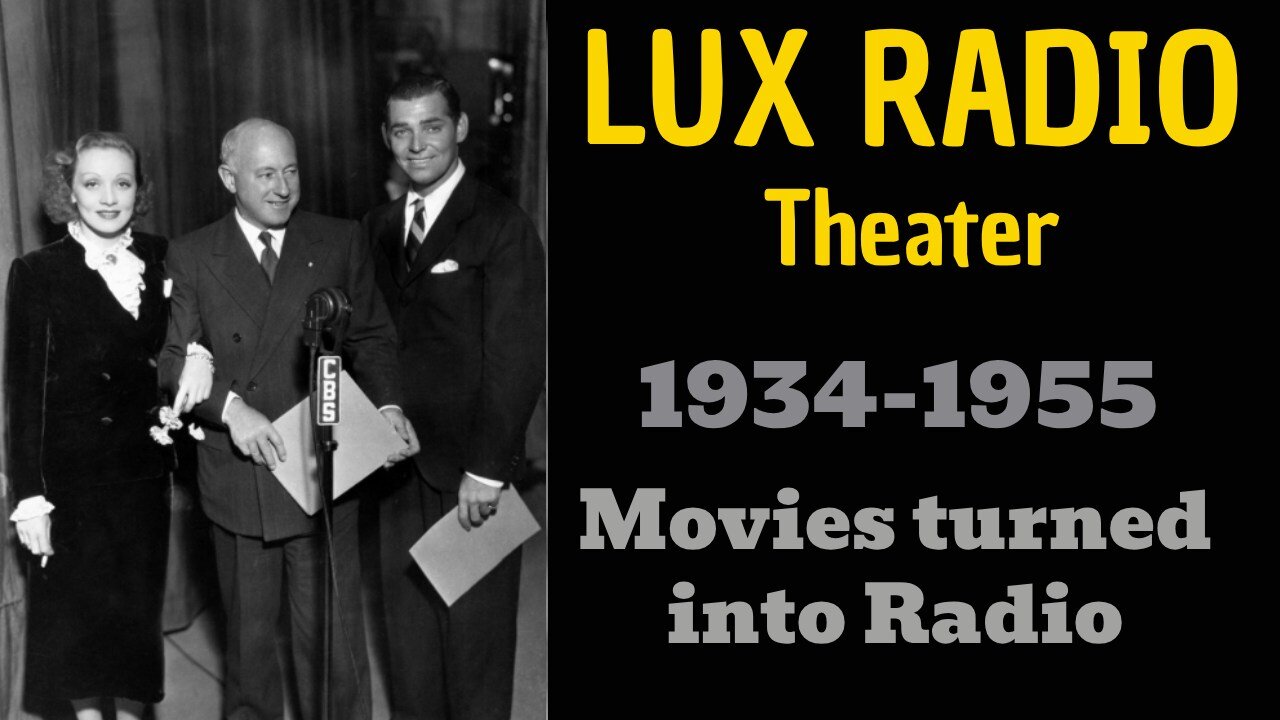Premium Only Content

Lux Radio 38/05/09 (ep175) My Man Godfrey (William Powell, Carole Lombard)
Plot
During the Great Depression, Godfrey "Smith" Parke is unemployed, living with other homeless men down on their luck at a New York City dump in a Hooverville on the East River near the 59th Street Bridge. One night, a spoiled socialite named Cornelia Bullock offers him $5 to be her "forgotten man" for a scavenger hunt. The annoyed Godfrey refuses, causing Cornelia to retreat and fall on a pile of ashes, much to the glee of her younger sister and rival Irene. After talking with Irene, Godfrey finds her to be kind and offers to go with her to help her beat Cornelia, as well as satisfy his own curiosity regarding their scavenger hunt.
In the ballroom of the Waldorf-Ritz Hotel, Irene's businessman father Alexander Bullock waits resignedly as his wife Angelica and her mooching protégé Carlo play the game. Godfrey arrives and is authenticated as a "forgotten man", allowing Irene to win the game. However, Godfrey takes the opportunity to address his contempt for the audience's antics before leaving in a huff. Realizing what she brought him into, an apologetic Irene offers Godfrey to be her protégé by hiring him as the new family butler, which he gratefully accepts.
Lux Radio Theatre was indisputably the biggest, most important, most expensive drama anthology program on radio. It ran from October 14, 1934 until June 7, 1955, then continued on television as Lux Video Theatre until 1957. In all, some 926 episodes were broadcast, providing a record of the most important entertainment events in American theatre and, later, film.
The show was first broadcast on the NBC Blue Network on Sundays at 2:30 PM. The show featured adaptations of successful Broadway plays when it was produced out of New York, such as Seventh Heaven, the first production starring Miriam Hopkins, Smilin' Through, Berkeley Square, Daddy Long Legs, Peg O' My Heart and Way Down East. On July 29, 1935, the show moved to Monday night at 9:00 PM on CBS, where it would stay until June 29, 1954. The show moved to Hollywood on May 25, 1936 with the production of The Legionnaire and the Lady, based on the film Morocco, starring Marlene Dietrich and Clark Gable. The audience for this production was estimated as high as 40 million. The show featured many of the most important films of the period, adapted to fit the 60 minute time slot. Some of the titles for 1939 should indicate the caliber and range of shows: Stage Door, Ceiling Zero, So Big, It Happened One Night, The Lives of a Bengal Lancer, Lady for a Day, The Life of Emile Zola, Tovarich, Only Angels Have Wings, The Prisoner of Zenda, The Awful Truth, Wuthering Heights, You Can't Take It With You, The Old Maid and Goodbye, Mr Chips. For its last season, (1954-1955), the show moved to Tuesday nights at 9 on NBC.
Lux Radio Theatre was always broadcast live, with a studio audience and a full orchestra accompanying the performance and providing musical transitions between scenes. As many film actors were used to numerous takes and not live performance, they sometimes suffered acute stage fright before the show. However, since most received $5,000 for their performance -- in addition to free publicity for upcoming pictures -- actors appeared in their original screen roles if they were available. Indeed, production would halt if necessary, on a film if performers were called to appear on Lux. When the actors were not available, others stepped in. The plays were assembled and rehearsed for a week, in sharp contrast to many other shows, which required a minimal of an actor's time. Regular players for the series included Jim and Marian Jordan, otherwise known as Fibber McGee and Molly. Hosts included Cecil B. DeMille (1936-1945), William Keighley (1945-1952) and Irving Cummings (1952-1955). Directors included Tony Stanford, Frank Woodruff, Fred MacKaye and Earl Ebi.
-
 48:44
48:44
Man in America
11 hours agoA MASSIVE Global Financial Reset Is Coming—Are You Ready?
37.6K8 -
 1:15:42
1:15:42
Precision Rifle Network
1 day agoS4E5 Guns & Grub - The Best Rifle Under $2000
59.5K6 -
 1:02:54
1:02:54
Glenn Greenwald
1 day agoSouth Korean Economist Ha-Joon Chang on the Economic World Order, Trump's Tariffs, China & More | SYSTEM UPDATE #410
83.7K50 -
 1:02:27
1:02:27
Donald Trump Jr.
12 hours agoBye Mitch, plus Kash confirmed, Interview with AJ Rice | Triggered Ep.218
130K73 -
 1:12:27
1:12:27
The Amber May Show
13 hours ago $3.12 earnedWomen Of Rumble 02-20-25
36K7 -
 41:18
41:18
Kimberly Guilfoyle
12 hours agoToday, We Kash in on Equal Justice, Live with Ryan Walters & Daniel Turner | Ep.198
98.9K22 -
 1:36:50
1:36:50
Redacted News
11 hours agoThe TRUTH in Ukraine has been EXPOSED by Trump and they are melting down | Redacted w Clayton Morris
139K231 -
 2:05:35
2:05:35
The White House
12 hours agoPresident Trump Hosts a Reception Honoring Black History Month
87.8K45 -
 1:05:09
1:05:09
Josh Pate's College Football Show
12 hours ago $1.12 earnedCFP Expansion: Latest Intel | CFB’s Schedule Problem | Arch Manning Hype | ACC Program Rankings
32.3K5 -
 55:52
55:52
LFA TV
1 day agoTrump vs. Europe | TRUMPET DAILY 2.20.25 7PM
42.6K8